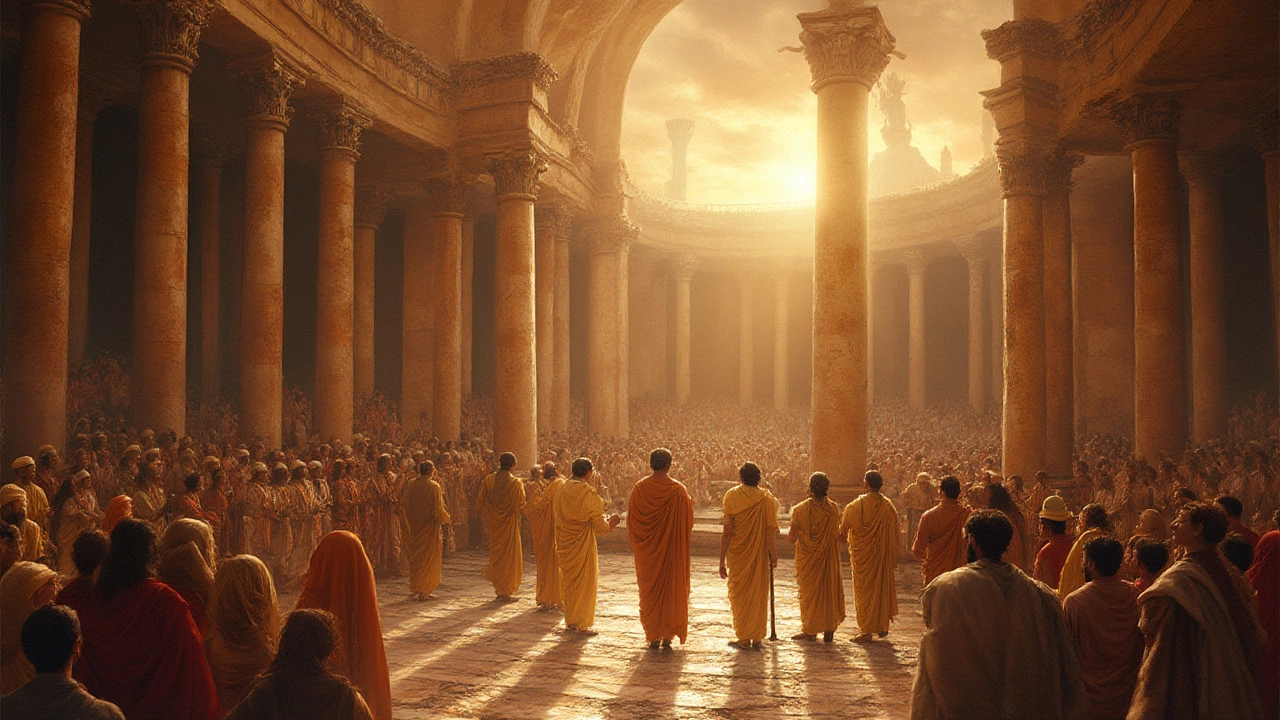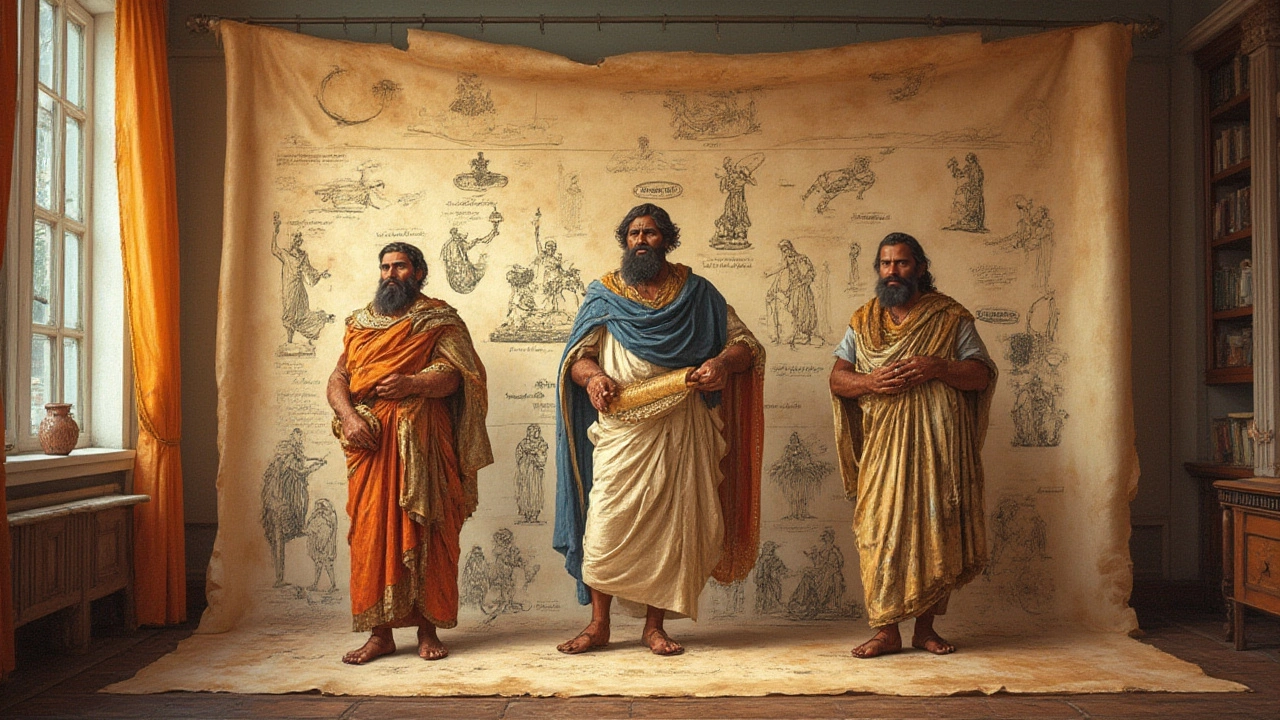Oldest of the Three Great Tragic Poets: Who Came First?

Greek tragedy didn’t just pop out of nowhere. It started with a bang—with jaw-dropping stories about gods and mortals, jealousy, vengeance, and some seriously epic drama. But here’s the million-drachma question: among Aeschylus, Sophocles, and Euripides, which tragic poet was the oldest? Spoiler alert—it’s not who most people think, and the answer leads us to stories about feuds, wild festivals, timely deaths, and Olympic-level egos that shaped everything we call classical drama today. If you’re curious about ancient celebrity rivalries or just want to impress someone the next time Greek theatre comes up (hey, stranger things have happened), buckle up for some ancient gossip, dusty details, and a few surprises.
Who Were the Three Great Tragic Poets?
First, let’s get to know our main characters. There’s Aeschylus, often dubbed the ‘Father of Tragedy’, striding onto the scene around 525 BCE. Then comes Sophocles, the pride of wealthy Athens, born circa 496 BCE, and finally Euripides—the “bad boy” of ancient Greek literature—making his entrance around 480 BCE. These guys weren’t just poets. They were rockstars. Every year during the City Dionysia festival in Athens, crowds packed the stone theatres for new plays, and winning was more than just a trophy—it was eternal glory. These poets shaped what we think of as ‘tragedy’: intense family dramas, impossible choices, war, old gods versus fresh ideas, long before there was ever a Hollywood.
Aeschylus broke all the rules, Sophocles refined them, and Euripides just tossed the rulebook out the window. It’s like comparing Beatles, Stones, and, well, Nirvana. Their lives overlapped a little, but these three still ended up shaping their own eras in ancient drama. If you ever notice how modern stories sneak a tragic hero into the plot, thank them.
To really see how things played out, check out this table breaking down their lifespans and their most famous works:
| Poet | Birth Year | Death Year | Famous Works |
|---|---|---|---|
| Aeschylus | c. 525 BCE | c. 456 BCE | Oresteia (Agamemnon, The Libation Bearers, The Eumenides) |
| Sophocles | c. 496 BCE | c. 406 BCE | Oedipus Rex, Antigone, Electra |
| Euripides | c. 480 BCE | c. 406 BCE | Medea, The Bacchae, Hippolytus |
So, yes—Aeschylus stood at the starting line and set the pace. But there’s way more drama hidden in the details.
Aeschylus: Pioneer of Greek Tragedy
This guy didn’t invent Greek tragedy, but he brought it out of its awkward teenage years. Lived through the Persian Wars, actually fought at Marathon (imagine Hemingway storming Normandy), got hailed as the “Father of Tragedy,” and wrote somewhere around 70 to 90 plays. Only seven survived, but what a set. His trilogy, “Oresteia,” is still jaw-dropping and heavy on the fate-versus-free-will themes. His style? Big, booming, full of gods and grandeur—sometimes literally, with actors hoisted up on cranes or thundering across the stage in costume armor.
Aeschylus was also an experimenter. Before him, Greek drama had just one actor and a chorus. He got wild and added a second actor—suddenly, you’ve got dialogue. Now imagine that moment—two people talking to each other on stage, while the crowd probably gasped in their tunics. It changed everything. He made costumes and stage effects flashier, upgraded the chorus, and set the vibe for future playwrights.
A fun tidbit: legend says his death was just as epic as his plays. Supposedly, while he was hanging out in Sicily, an eagle dropped a tortoise on his head, mistaking his bald noggin for a rock. True or not, it’s poetic. And how about this? After his death, Athens let his plays compete for prizes for decades—nobody else got that honor.
If you want a tip for tackling his work today, don’t rush it. The imagery and words can feel thick as honey, and there are lots of references to old myths, but the reward is watching the start of something huge. Every time you see a courtroom drama or a story about vengeance, think back to Aeschylus kicking things off two and a half millennia ago.
Sophocles: The Uber-Polished Mastermind
Sophocles grew up in the shadow of Aeschylus but didn’t let it get to him. He was younger—born around 496 BCE—but outlived both his mentor (Aeschylus) and his rival (Euripides). While Aeschylus did big, heavy myth, Sophocles focused on personality and psychology. Want to know who came up with the idea of a tragic hero bringing about their own downfall? Sophocles owned that. His “Oedipus Rex” is still assigned in high school lit classes worldwide, which probably says enough.
Here’s what set Sophocles apart: he plucked the drama out of the gods’ hands and placed it squarely on the shoulders of people. His characters feel modern—they overthink, they break down, they cry out. He also added a third speaking actor, making scenes much richer and more tense. In terms of stats, Sophocles wrote over 120 plays (only seven survived). Fun fact: he won first prize at Athens’ festival at least 20 times and never placed below second. His plays moved crowds to tears.
Sophocles had a stable and cushy life. He served in government, dined with the elite, and died peacefully (probably around 90 years old—practically a miracle at the time). When his final plays were staged after his death, Athenians still raved over his genius. If you’ve ever wondered about moral gray areas or stories about fate versus free will, you’re basically on Sophocles’ turf. His themes—pride, guilt, duty—still pack a punch. And that whole “tragic flaw” thing you see in every complex movie character? That’s his stamp.

Euripides: The Radical Outsider
Now for the youngest, but by no means the least interesting. Euripides, born around 480 BCE, almost always played the outsider’s card. He showed up in Athens a bit later than the other two but made waves right away. Where Aeschylus and Sophocles aimed for the stars, Euripides dove into how messed up people could be. Think emotional train wrecks and nasty twists. His characters argue, throw tantrums, and sometimes just talk nonsense—for the first time, everyday voices showed up on stage, instead of only grand heroes.
He wrote about 90 plays, of which 19 survived. These plays often shocked audiences. Take “Medea”—the heroine kills her own kids out of revenge. Or “The Bacchae”—wild rites, madness, tragic kings torn apart by their own mothers. If you feel uneasy reading him, know you’re in good company. Athenians sometimes booed. Even Aristophanes (who made a career out of mocking rivals) poked fun at him.
Despite all that, Euripides outlived the other two, passing away in 406 BCE (a few months before Sophocles). Legend has it he spent his last days in Macedon, away from Athens, likely tired of all the drama—both literal and courtly. But here’s a kicker: over time, folks realized how modern his plays were. Sigmund Freud, for example, actually quoted Euripides. Directors and novelists from Tolstoy to modern playwrights still snatch up his plots.
If you’re curious, start with “Medea” or “The Trojan Women”—dark, raw, but shockingly human. Euripides’ radical spirit shows how art can rattle everyone’s cages, and sometimes that’s what sticks around the longest.
Tips for Exploring Ancient Greek Tragedy Today
Diving into ancient Greek tragedy can feel like reading a dusty manual at first, but it doesn’t have to be a slog. Here are some quick ways to make it easier—and way more enjoyable:
- Start with modern translations. Don’t torture yourself with complicated, outdated versions; newer translations keep the wit and raw emotion.
- Before you read, check out a five-minute summary video or a podcast episode—context is everything with these plays.
- Look up legendary performances. Stars like Laurence Olivier, Helen Mirren, and even Greek street troupes have put a wild spin on these tales.
- Join a book club or online group. Seriously, these stories spark much richer conversations when you react together to all the twists and turns.
- Remember these writers loved spectacle. Try to imagine thunder, wild costumes, and crowds of Athenians gasping with every big reveal—don’t just read; watch clips or even go to a live performance if you can!
- Track the keywords and themes—guilt (Aeschylus), choice versus fate (Sophocles), and raw human passion (Euripides).
- If you want a lighter route, look for retellings—like modern novels or films—based on their plots. Once you see the bones of Oedipus or Medea in today’s movies, the old plays come alive.
The competition between the tragic poets wasn’t just about showmanship; it was a clash of ideas, values, and styles that still echoes now. Try reading each one’s best-known play and see whose style hits you the hardest.
Why Knowing Who Was Oldest Matters
So, now you know Aeschylus came first among the three tragic poets—not just in age, but in style, substance, and influence. Understanding that helps piece the whole timeline together. You see the evolution: Aeschylus builds the stage, Sophocles perfects the poetry, and Euripides wrecks the comfort zones. If someone’s asking who’s the oldest, they’re really asking who started all this dramatic madness. The answer is Aeschylus, born when Persians were knocking at the Athenian door, literally writing as the city found its feet.
It’s more than a fun-fact for pub quizzes. It’s about tracing the growth of an art form. Tragedy gave us catharsis—a real, gut-level emotional roller-coaster—which everyone still craves in movies, books, or even streaming series today. You can plot today’s storytelling giants on the same line that starts with Aeschylus. This trio didn’t just share a time or place—they competed, influenced each other, and their rivalries pushed every boundary we now call “classic.” Looking back, we see how the oldest, Aeschylus, set in motion a legacy that’s still running strong thousands of years later.
Dust off those ancient stories and give them another look. You’re not just staring at old myths; you’re reading the original scripts behind everything from soap operas to Oscar bait. And every time you ask, “Who was the oldest?” you’re really asking, “Where did this all begin?” It started with Aeschylus, and honestly, the drama hasn’t stopped since.